
National Water Quality Month reminds us how vital our drinking water is and how we can all play a role in protecting it.
Knowing where your water comes from makes it easier to appreciate the quality of your local waterways, and can motivate you and your community to keep these water sources as clean as possible. Educating yourself on where your water comes from and where it goes after you use it can help motivate you and your community to keep your water sources as clean as possible. Start by reading through the Water Quality Report provided annually by Denver Water.
Additionally, by incorporating any or all of the following actions into your life, you can rest easy knowing that you’re helping to ensure that clean drinking water is readily available for everyone for years to come.
9 Things You Can Do at Home to Protect Your Water
1. Wash your car at a car wash: Even though it might cost more than washing your car at home, taking your car to a car wash saves water and prevents toxic chemicals from being flushed down your storm drains that eventually empty into our lakes, rivers, streams, and oceans Professional car washes are legally required to drain into sewer systems so that the water can be treated before being re-used.
2. Pick up after your pet: Animal waste is full of nitrogen which can remove oxygen from the water leaving it completely unusable for aquatic life.
3. Don’t hose down your driveway, use a broom.
4. Don’t use fertilizer made with phosphorus: After heavy rainfall or watering, these chemicals can leak into nearby groundwater sources. Try using organic materials or waiting for drier weather if you absolutely need to use lawn care products.
5. Do not flush expired or unwanted medication down the toilet: These products have toxic chemicals that should not be flushed down the drain.
6. Learn how to properly dispose of leftover paint: Even house paint thrown in the trash can impact local water.
7. Take used oil or antifreeze to a service station or recycling center.
8. Avoid using antibacterial soaps or cleaning products in your drain as they are also toxic to marine life.
9. Use a rain barrel to collect rainwater: Installing a rain barrel will not only save you money, but can also be used for watering your lawn or washing your car.